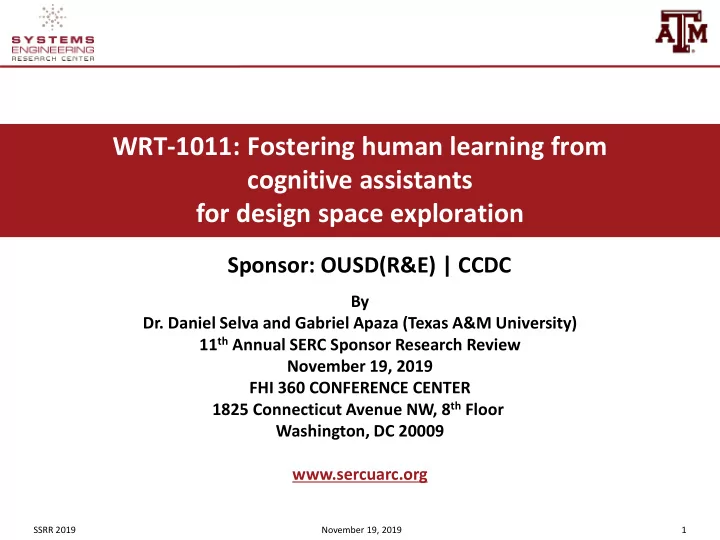

WRT-1011: Fostering human learning from cognitive assistants for design space exploration Sponsor: OUSD(R&E) | CCDC By Dr. Daniel Selva and Gabriel Apaza (Texas A&M University) 11 th Annual SERC Sponsor Research Review November 19, 2019 FHI 360 CONFERENCE CENTER 1825 Connecticut Avenue NW, 8 th Floor Washington, DC 20009 www.sercuarc.org SSRR 2019 November 19, 2019 1
Why cognitive assistants? • The time is ripe for adoption of this technology in the workplace • Technology push : Advances in Machine Learning (NLP) • Societal push : Digital assistants are ubiquitous in our daily lives • Still some challenges, need to better understand and improve human-VA interaction in engineering context SSRR 2019 November 19, 2019 2
Design Space Exploration (DSE) • Context : Early system architecture and concept studies 1. Define a solution space (or design space) by means of a set of decisions and allowed values 2. Define an objective space by means of a number of metrics 3. Compose models to map solution space to objective space 4. Use search/optimization to generate large dataset of alternatives 5. Use visual and data analytics to explore dataset and draw conclusions 6. Iterate SSRR 2019 November 19, 2019 3
DSE is challenging • Information overload , especially when the solution and/or objective spaces are high-dimensional • Information retrieval : Need information from many different sources (time-consuming) ? • Sense-making : How do we interpret the results? • Garbage-in-garbage-out : All models are wrong, and optimization tools are good at exploiting unrealistic ? model assumptions • Simultaneously doing model validation and tradespace exploration SSRR 2019 November 19, 2019 4
Cognitive assistants can help • Cognitive assistant : An AI agent that augments human cognition for a specific task • Usually has a Question Answering (QA) system with a natural language interface • 5 main components ― Front-end : GUI, robot ― QA system : ML for NLP (query intent classification) ― Skills/roles : Specialized QA agents (e.g., weather) ― Back-ends : Functions needed to help skills answer requests ― Data/knowledge sources : relational databases, ontologies, knowledge graphs. (C) Daniel Selva 2019 SSRR 2019 November 19, 2019 5
The Daphne-EO cognitive assistant SSRR 2019 November 19, 2019 6
Daphne-EO front end SSRR 2019 November 19, 2019 7
CA do increase performance in DSE tasks • Conducted a study at JPL with N=9 system engineers • 2 conditions (Daphne-VA vs no VA) • Measured design quality, diversity, human learning, and usability • Within-subjects, counter-balanced design SSRR 2019 November 19, 2019 8
But they may decrease human learning • What is it that people are learning with DSE tools? • Sensitivities, couplings between parameters, driving features, what-if questions • How do we actually measure human learning in DSE? • Tests • What types of questions? • Bloom’s taxonomy • Factual information • Prediction • Synthesis SSRR 2019 November 19, 2019 9
How can we foster human learning in CA? • Add a Teacher role that: 1. Helps the user explore underexplored areas of the design/objective space 2. Points out relevant information to the user (e.g., sensitivities) 3. Asks questions to the user (e.g., about driving features) focusing on areas where the user shows less understanding SSRR 2019 November 19, 2019 10
Current and future work • Studying different ways of measuring learning in DSE • Conducting pilot study to see if Teacher role actually fosters learning • How do we take into account the fact that we are simultaneously exploring the design space and estimating user learning? ― Borrow from intelligent tutoring systems literature SSRR 2019 November 19, 2019 11
References • Viros, A., Member, S., and Selva, D., “Daphne : A Virtual Assistant for Designing Earth Observation Distributed Spacecraft Missions,” IEEE Journal of Selected Topics in Applied Earth Observations and Remote Sensing . Accepted. 2019. • Viros Martin, A., and Selva, D., “From Design Assistants to Design Peers: Turning Daphne into an AI Companion for Mission Designers,” AIAA Information Systems-AIAA Infotech at Aerospace, 2019 , 2019. • Bang, H., Viros, A., Prat, A., and Selva, D., “Daphne : An Intelligent Assistant for Architecting Earth Observing Satellite Systems,” 2018 AIAA Information Systems-AIAA Infotech @ Aerospace, AIAA SciTech Forum , 2018, pp. 1–14. SSRR 2019 November 19, 2019 12
Recommend
More recommend